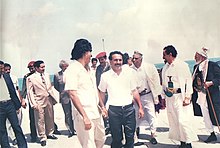Ali Salim al-Beidh
| Ali Salem al Beidh | |
|---|---|

Ali Abdullah Saleh and Ali Salim al Beidh, 1990
|
|
| Deputy Chairman of the Presidential Council of Yemen | |
|
In office 22 May 1990 – 21 May 1994 |
|
| President | Ali Abdullah Saleh (Chairman of the Presidential Council) |
| Prime Minister |
Haidar Abu Bakr al-Attas Muhammad Said al-Attar |
| Preceded by | Position Created |
| Succeeded by | Abd Rabbuh Mansur Hadi (Vice President) |
| Personal details | |
| Born |
February 10, 1939 Hadhramaut |
| Political party |
Yemeni Socialist Party Al Hirak |
| Religion | Islam |
Ali Salem al Beidh (‘Alī Sālim al-Bīḍ, Arabic: علي سالم البيض) (born 10 February 1939) is a Yemeni politician who served as the General Secretary of the Yemeni Socialist Party (YSP) in South Yemen and as Vice President of Yemen following the unification in 1990. He left the unification government in 1993, sparking the 1994 civil war in Yemen and then went into exile in Oman. He is a leader of the Southern independence movement known as Al Hirak.
A former Politburo member, al-Beidh took the top position in the YSP following a 12-day 1986 civil war between forces loyal to former chairman Abdul Fattah Ismail and then-chairman Ali Nasir Muhammad. An Ismail ally, he took control after Muhammad's defeat and defection and Ismail's disappearance. In a coup that took the lives of anywhere from 4,000 to 10,000 people, al-Beidh was one of the few high-ranking officials who survived.
Suffering a loss of more than half its aid from the Soviet Union from 1986 to 1989 and an interest in possible oil reserves on the border between the countries, al-Beidh's government worked toward unification with North Yemen officials.
Following the unification of South Yemen with the Yemen Arab Republic in 1990, he took up the position of vice-president in the transition government of unified Yemen. But in 1993, al-Beidh quit the government and returned to the former Southern capital of Aden, claiming that the new government was systematically marginalizing the southern people ignoring the needs of the south. On 21 May 1994, as the South's military position weakened, al-Beidh declared the Democratic Republic of Yemen. He served as the only President of the DRY, from 21 May to 7 July 1994. Al-Beidh fled to the neighboring Sultanate of Oman after the secession failed.
...
Wikipedia
